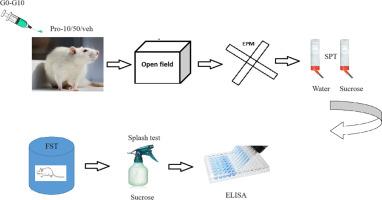产前黄体酮暴露对成年雄性和雌性大鼠后代焦虑和抑郁样反应的有害影响:血浆、海马皮质酮和海马黄体酮受体的作用。
IF 2.4
3区 医学
Q2 BEHAVIORAL SCIENCES
引用次数: 0
摘要
在临床实践中,由于激素水平的降低和流产的风险,辅助生殖项目通常需要使用外源性黄体酮(Pro)。啮齿类动物暴露于该激素可减少焦虑,但产前暴露对成年后代的长期影响尚不清楚。因此,本研究旨在探讨产前丙种球蛋白治疗对焦虑和抑郁样行为的影响,以及对年轻成年雄性和雌性大鼠后代血浆、海马皮质酮(CORT)和海马孕酮受体(PR)的影响。对雌雄大鼠后代的行为反应进行了开阔地和高架加迷宫试验测试,以及蔗糖偏好试验、强迫游泳试验和飞溅试验中的抑郁样行为测试。用酶联免疫吸附法测定了 CORT 水平和 PR 表达。结果表明,与车辆处理的对照组相比,产前低剂量和高剂量(10 和 50 毫克/千克,G0-G10 期间 s.c.)Pro 暴露会诱发焦虑和抑郁样效应,这些效应与高血浆和海马 CORT 水平以及雄性和雌性成年后代海马 PR 上调有关。我们的研究结果表明,产前暴露于 Pro 会对成年男女后代的情绪状态产生不利影响,这可能与激素平衡的长期变化有关。本文章由计算机程序翻译,如有差异,请以英文原文为准。

Detrimental effect of prenatal progesterone exposure on anxiety and depressive-like responses in adult male and female rat offspring: Role of plasma, hippocampal corticosterone and hippocampal progesterone receptors
In clinical practice, the use of exogenous progesterone (Pro) is often required in assisted reproduction programs due to reduced levels of the hormone and the risk of miscarriage. Exposure to the hormone reduces anxiety in rodents, but the long-term effects of prenatal exposure in adult offspring are unknown. Therefore, the present study was designed to investigate the effect of prenatal Pro treatment on anxiety- and depression-like behavior and the effect on plasma, hippocampal corticosterone (CORT) and hippocampal progesterone receptor (PR) in young adult male and female rat offspring. The behavioral responses of offspring of both sexes were tested in the open field, and the elevated plus maze tests, and for depressive-like behavior in the sucrose preference test, the forced swimming test and the splash test. CORT levels and PR expression were measured by ELISA. The results indicate that prenatal Pro exposure at low and high doses (10 and 50 mg kg-1, s.c. during G0-G10) induces anxiogenic and depressive-like effects compared to vehicle-treated controls, which are associated with high plasma and hippocampal CORT levels and upregulated hippocampal PR in male and female adult offspring. Our results demonstrate that prenatal Pro exposure has detrimental effects on the emotional status of male and female adult offspring, which may be associated with long-term changes in hormonal homeostasis.
求助全文
通过发布文献求助,成功后即可免费获取论文全文。
去求助
来源期刊

Physiology & Behavior
医学-行为科学
CiteScore
5.70
自引率
3.40%
发文量
274
审稿时长
47 days
期刊介绍:
Physiology & Behavior is aimed at the causal physiological mechanisms of behavior and its modulation by environmental factors. The journal invites original reports in the broad area of behavioral and cognitive neuroscience, in which at least one variable is physiological and the primary emphasis and theoretical context are behavioral. The range of subjects includes behavioral neuroendocrinology, psychoneuroimmunology, learning and memory, ingestion, social behavior, and studies related to the mechanisms of psychopathology. Contemporary reviews and theoretical articles are welcomed and the Editors invite such proposals from interested authors.
 求助内容:
求助内容: 应助结果提醒方式:
应助结果提醒方式:


